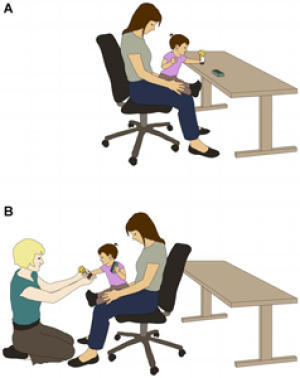最新一项研究显示婴儿也拥有公平和无私的素质,调查结果显示15个月大的宝宝已经能够区别食物是否公平分配,并且这种分配意识与他们分享玩具意愿相关。这对研究对人类的平等主义和合作精神的形成有着重大的影响。这一研究结果公布在10月7日出版的国际学术期刊《PLoS综合》上。

研究的主要负责人,华盛顿大学心理学副教授Jessica Sommerville表示人类学会公平和无私这些行为比我们想的早的多。
同时,研究也研究了婴儿的公平与无私行为之间的关系,那些对食物的公平分配更敏感的宝宝更愿意和别人分享他们喜欢的玩具。
之前有研究证明2岁的小孩懂得帮助其他人,大约6到7岁的孩子体现出公平感,从事儿童早期发育研究的专家Sommerville推测儿童在更小的时候就表现出这些特征。
调查发现15个月大的婴儿就能表现出一些合作行为,比如自发的帮助他人,因此我们设想他们是否具有公平和无私的意识,因为合作行为预示着公平原则。
在实验过程中,一个15个月大的宝宝坐在母亲的腿上观看两个有关分享的短视频。视频里的一个实验者拿着以一袋饼干分给其他两个实验者,他们把饼干分了两次,一次平均分配饼干,另一次是其中一个人分到了较多的饼干。第二个实验场景还是一样,只不过这次是一罐牛奶而不是饼干。
然后实验对47个宝宝进行了单独的测试。根据“违反期望理论”,当宝宝们惊讶的时候他们会付出更多的注意力,结果显示当视频中其中一个人拿到更多的食物,宝宝们会花更多的时间观看视频。
Sommerville说因为婴儿期待是公平的分配食物,所以当他们看到有人分到更多的饼干或者牛奶的时候会非常惊讶。

为了验证宝宝的公平感是否与他们分享意愿相关,研究人员做了第二个实验:让宝宝在简单的乐高积木玩具和精心制作的乐高玩具娃娃中进行挑选,并且将他们挑选出的玩具贴上宝宝最喜欢的标签。然后一位陌生的实验人员询问宝宝,他是否可以拥有这个玩具?结果,三分之一的宝宝分享了他们喜欢的玩具;另外三分之一分享了他们不喜欢的玩具;剩下的宝宝一个玩具也没分享,也许是因为紧张或者是不愿意分享。
通过比较玩具分享和食物分配的两个实验结果,研究人员发现92%愿意分享他们喜欢玩具的宝宝会花费更多的时间观看不公平分配的视频,相反,86%愿意分享他们不喜欢的玩具的宝宝会更多的时间看公平分配食物的视频。
公平和无私是天生的,还是后天形成的?Sommerville's研究小组的下一个研究项目锁定在是否父母的价值观和信仰会改变婴儿的发展。(生物探索 millie)
相关英文论文摘要:
Fairness Expectations and Altruistic Sharing in 15-Month-Old Human Infants
Human cooperation is a key driving force behind the evolutionary success of our hominin lineage. At the proximate level, biologists and social scientists have identified other-regarding preferences – such as fairness based on egalitarian motives, and altruism – as likely candidates for fostering large-scale cooperation. A critical question concerns the ontogenetic origins of these constituents of cooperative behavior, as well as whether they emerge independently or in an interrelated fashion. The answer to this question will shed light on the interdisciplinary debate regarding the significance of such preferences for explaining how humans become such cooperative beings. We investigated 15-month-old infants' sensitivity to fairness, and their altruistic behavior, assessed via infants' reactions to a third-party resource distribution task, and via a sharing task. Our results challenge current models of the development of fairness and altruism in two ways. First, in contrast to past work suggesting that fairness and altruism may not emerge until early to mid-childhood, 15-month-old infants are sensitive to fairness and can engage in altruistic sharing. Second, infants' degree of sensitivity to fairness as a third-party observer was related to whether they shared toys altruistically or selfishly, indicating that moral evaluations and prosocial behavior are heavily interconnected from early in development. Our results present the first evidence that the roots of a basic sense of fairness and altruism can be found in infancy, and that these other-regarding preferences develop in a parallel and interwoven fashion. These findings support arguments for an evolutionary basis – most likely in dialectical manner including both biological and cultural mechanisms – of human egalitarianism given the rapidly developing nature of other-regarding preferences and their role in the evolution of human-specific forms of cooperation. Future work of this kind will help determine to what extent uniquely human sociality and morality depend on other-regarding preferences emerging early in life.
论文全文链接:https://www.biodiscover.com/news/bioresearch/library/1370







